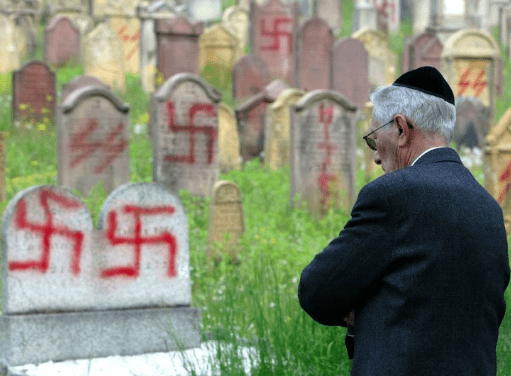In 2018, there were a variety of important actions against antisemitism. Summarizing the main ones at the end of the year provides some counterweight to the annual report of the worst antisemitic incidents — regularly increasing in pages — published now for a number of years by the Simon Wiesenthal Center.
One important development is the expanding acceptance of the definition of antisemitism of the International Holocaust Remembrance Alliance definition (IHRA). One cannot try to fight antisemitism effectively unless there is a common measure of what it entails. By now the IHRA antisemitism definition had been formally adopted for internal use by the United Kingdom, Israel, Austria, Scotland, Romania, Germany, Bulgaria, Lithuania and the formerly Yugoslav Republic of Macedonia. It has also been accepted by a wide array of others such as universities and towns including the cities of London and Berlin.
A second substantial development was successes in the fight against the BDS movement which aims to delegitimize the State of Israel. Legal measures play an important role in hampering BDS. In November 2018, Kentucky became the 26th American state to pass legislation to ban awarding state contracts to companies that endorse the BDS movement. The governors of all 50 US states have signed a declaration condemning the BDS movement as antithetical to American values. Chile has recently forbidden its municipalities to boycott Israel by aligning themselves with the BDS movement as a reason not to conduct business with Israel. Various municipalities in Spain have also tried to apply BDS to their practices. However, a number of courts have voided these measures, for instance, in Barcelona.
Yet another positive development is the appointment of antisemitism commissioners in Germany. This occurred at the national level but also in a variety of federal states. National commissioner Felix Klein has already addressed many aspects and incidents of antisemitism in Germany. He has, for instance, indicated that he intends to tackle the political distortion of reported statistics of antisemitic acts. Crimes against Jews by unknown perpetrators are registered as having been committed by extreme right-wingers, while attacks on Jews by Muslims are far more numerous than what is recorded. Among the state commissioners, Ludwig Spaenle of Bavaria has initiated a monitoring function that is slated to become operational next year.
The European Commission had already in 2015 appointed Katharina von Schnurbein as the coordinator for combating antisemitism. She has undertaken various initiatives, however has not been given anywhere near adequate resources to fulfill her task in exposing the massive antisemitism among the more than 500 million EU citizens.
A fourth important development is the increasing assurance of the security of synagogues and other Jewish institutions. Switzerland has been extremely negligent in this area. Finally this year, the first Swiss city, Basel, belatedly decided to join this process and assign police officers to guard the synagogue. This is an important precedent and challenge for other towns in the country.
A fifth important development is the publication of additional studies on antisemitism. In December, the Fundamental Rights Agency (FRA) released a report it claims is the largest study on antisemitism ever undertaken. It investigated twelve European Union countries and is titled: “Experiences and Perceptions of Antisemitism.” The study found that the most common antisemitic statement encountered by Jews in Europe is that Israelis behave like Nazis toward the Palestinians. Muslim antisemitism is mentioned as the dominant identified source of harassment of Jews in Europe. It is followed by left-wing antisemitism and right-wing antisemitism. It is a Europe-wide problem that due to poor follow up, most victims of antisemitic incidents do not complain to the authorities.
There are many other incidental or smaller issues of importance. One was a French manifesto against Muslim antisemitism that was signed by 250 Jewish and non-Jewish personalities. This document sums up the main elements of violence and incitement against Jews emanating from parts of this immigrant community. One can only hope next year others will follow in those footsteps and expose what a variety of European governments try to hide or whitewash. Fifteen years too late, French President Emmanuel Macron has formally accepted that the murder of Jewish disk jockey DJ Sebastien Sellam in 2003 by a Muslim neighbor was an antisemitic act.
The Council of the European Union (EU) approved the first declaration of its kind to fight antisemitism and strengthen the security of Jewish communities in Europe. Outgoing US Ambassador Nikki Haley castigated the UN saying, “We will not tolerate a situation that a world body of 198 countries can spend half their time attacking one country: Israel.”
British media such as The Daily Mail and The Daily Telegraph have exposed the substantial antisemitism in the British Labour Party, which is led by Jeremy Corbyn, a friend of genocidal terrorists, associate of Holocaust deniers, anti-Israel inciter and part-time antisemite.
There are many other meritorious acts against antisemitism by individuals. Alyssa Milano refused to speak at the Women’s March in the US after two of its leaders Tamika Mallory and Linda Sarsour refused to break ties with the leading US antisemite Louis Farrakhan. Another important development was the firing of extreme anti-Israel inciter Marc Lamont, by CNN.
It should become a tradition to not only publish major antisemitic slurs at the end of each year. There is now also a possibility to publish successes in the fight against antisemitism.
Dr. Manfred Gerstenfeld is the emeritus chairman of the Jerusalem Center for Public Affairs. He was given the Lifetime Achievement Award by the Journal for the Study of Antisemitism, and the International Leadership Award by the Simon Wiesenthal Center.
The article was published in The JPost

















